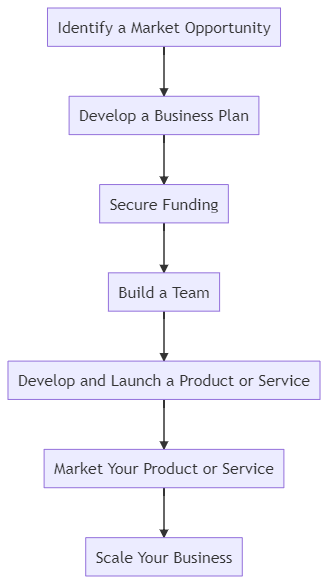
Welcome to our comprehensive guide to startup companies. In this article, we will provide you with all the information you need to know about startup companies, from what they are, how they function, and how they differ from traditional companies.
What is a Startup Company?
A startup company is a newly established business or industry designed to meet a specific need in the market.
These businesses or new startups are often founded by entrepreneurs who have identified an opportunity and have developed a product or service that meets a demand in the market.
Startup companies typically have one founder and a small team of employees and are often funded by venture capital funds, capitalists, or angel investors.
How do Startup Companies Function?
Startup companies typically have a unique business model designed to scale quickly. These businesses focus on rapid growth and prioritize customer acquisition and revenue growth over profitability.
This business strategy means that startup companies often operate at a loss for several years before they become profitable.
Startup companies often leverage technology to disrupt traditional industries and create new markets more than job opportunities.
These small businesses are often more agile than traditional companies and can pivot quickly based on market feedback.
How are Startup Companies Different from Traditional Companies?
Startup companies differ from traditional companies in the sense of several important ways. Firstly, entrepreneurs often founded startup companies with a vision for a new product or service.
On the other hand, traditional companies are typically founded by established businesses looking for a new business to expand their operations, making revenue elsewhere.
Secondly, startup companies typically have fewer employees than traditional companies. This allows the employees within them to be more agile and flexible in their development and sales approach.
Finally, startup companies often prioritize customer acquisition over profitability. This means they are willing to operate at a loss for several years before becoming profitable. Traditional companies, on the other hand, prioritize profitability from the outset.

How to Start a Startup Company?
Starting a startup company can be a challenging but rewarding experience. Here are the key steps you need to take to start up a startup company:
Identify a market opportunity
Develop a business plan
Secure funding
Develop and launch a product or service
Market your product or service
Scale your business
Benefits of Starting a Startup Company
One of the most significant benefits of starting or creating a startup is the further growth and potential for substantial financial gain.
Successful startup companies have the potential to become very valuable, which can translate into significant returns for startup founders, employees, and early investors.
In addition to financial gain and the job, starting a startup company can enrich the founder’s experience. Founders can bring their vision’s most valuable company to life and create something that positively impacts the world.
Challenges of Starting a Startup Company
Starting a startup company is not without its challenges. One of the most prominent challenges startups in the tech industry face is securing funding. Unfortunately, investors are often hesitant to invest in unproven businesses, so founders and early adopters of tech startups may need to rely on personal savings or loans to get their businesses off the ground.
Another challenge for startups and serial entrepreneurs is building a team. Founders of startups need to find individuals who are passionate about their vision and are willing to take on the risks associated with working for a startup company.
Finally, startup companies often face a high degree of uncertainty in the early stages of development. Market conditions can change quickly, and founders need to be able to pivot quickly to remain competitive.
Tips for Building a Successful Startup Company
Here are some tips for building a successful startup company:
Focus on solving a real problem
Build a strong team
Create a culture of innovation
Be agile and adaptable
Continuously iterate and improve your product or service
Focus on customer acquisition
Manage your finances carefully
Network and build relationships with investors and mentors
Why Start a Startup Company?
Starting a startup company can be an enriching experience. It allows you to take control of your career and create something meaningful.
Here are a few reasons why you might consider starting a startup company:
Pursuing Your Passion:
Starting a startup company allows you to pursue your passion and turn it into a profitable business. This can be incredibly fulfilling, as you can work on something you genuinely believe in.
Flexibility:
Starting a startup company also provides flexibility regarding work hours and location. You can work on your schedule and from anywhere in the world.
Innovation:
Startup companies are often at the forefront of innovation, developing new technologies and disrupting traditional industries. As a founder, you have the opportunity to create something truly groundbreaking.
Financial Gain:
While financial gain shouldn’t be the sole reason for starting a startup company, it’s certainly a nice perk. If your company becomes successful, you have the potential to make a significant amount of money.

Challenges of Starting a Startup Company
While there are benefits to starting a startup company, it’s not without challenges. Here are a few of the main challenges you and your co-founder might face:
Funding:
One of the biggest challenges facing startup companies is securing financing. Investors often hesitate to invest in unproven businesses, so you may need to rely on personal savings or loans to get your company off the ground.
Competition:
Startup companies often face stiff competition from established businesses. It can be challenging to break into a market that shows players already dominate.
Hiring:
Building a solid team is crucial to the success of your startup company. However, it can be challenging to find talented individuals who are willing to take a risk on a new company.
Uncertainty:
Startup companies often face a high degree of uncertainty. Market conditions can change quickly, and you need to be able to pivot quickly to remain competitive.
Tips for Success
Here are a few tips for building a successful startup company:
Solve a Real Problem:
Your company should solve a real problem people are willing to pay for. This will help ensure there’s a market for your product or service.
Build a Strong Team:
As mentioned earlier, building a solid team is crucial to the success of your startup company. Make sure you hire talented individuals who share your vision and are willing to take on the risks of working for a startup.
Focus on Execution:
While having a great idea is essential, it’s not enough to guarantee success. You need to be able to execute your vision and bring it to market.

Be Agile:
Startup companies need to be agile and adaptable to succeed. Be willing to pivot your business model if necessary and respond quickly to changes in the market.
Network:
Building relationships with investors, mentors, and other entrepreneurs can be incredibly valuable. Attend networking events and seek out mentorship opportunities.
Characteristics of a Startup Company
A business venture must possess certain characteristics to be classified as a startup company. These include:
- Innovative: Startups are known for offering innovative products or services that disrupt traditional industries.
- Scalable: A startup’s business model must have rapid growth and scalability potential.
- Risk-tolerant: Startups are willing to take risks and experiment with new ideas, even if they fail.
- Lean: Startups operate with limited resources and focus on achieving maximum efficiency.
- Visionary: Startups are founded by entrepreneurs with a vision for the future and a desire to create something new and meaningful.

The Importance of Startup Companies
Startup companies are vital globally, driving innovation and economic growth in other countries. They bring new ideas and products to the market, create jobs, and stimulate competition. Many technological advancements and breakthroughs we enjoy today would not exist without startups.
Key Steps to Starting a Successful Startup Company
Starting a successful small startup or company requires hard work, dedication, and perseverance. Here are some critical steps to help you get started:
- Identify a Problem and Solution
The first step in starting a successful startup company is to identify a problem and develop a solution. This could be anything from a small investment in a new app to solve a common problem to a physical product filling a market gap. Whatever your new business or business idea, ensuring demand for your product or service is essential.
- Conduct Market Research
Once you have an idea for a small business, conducting thorough market research is essential to ensure a viable market for your product or service. This includes researching your industry and target audience, understanding your competitors, and analyzing market trends.

- Develop a Business Plan
Once you’ve conducted market research, developing a comprehensive business plan is essential. This should include your mission statement, marketing strategy, and financial projections. A well-crafted business plan will help you stay on track and move in the right direction.
- Secure Funding
One of the biggest challenges facing startup companies is securing funding. There are several ways to fund a startup, including crowdfunding, angel investors, venture capital firms, and capitalists. It’s essential to have a solid financial plan in place for your small business or startup before approaching investors or venture capital firms. They will want to see that you have a clear path to profitability.
- Build Your Team
Building a solid team is crucial to the success of your startup company. This includes hiring talented individuals with the right skills and experience and creating a solid company culture. In addition, ensuring that everyone on your team is aligned with your vision and mission is essential.
- Develop Your Product or Service
Once you’ve secured funding and built your team, developing your product or service is time. This includes everything from designing your product to creating your website and marketing materials. It’s essential to ensure that your product or service is high-quality and meets the needs of most people in your industry and target audience.
- Launch and Scale
Once your product or service is ready, it’s time to launch and scale your product and develop your startup company. This includes everything from marketing your product to a scalable business model, building customer partnerships, and scaling your team. Again, focusing on your goals and continually iterating and improving your product or service based on customer feedback is essential.

Conclusion:
In conclusion, startup companies are an exciting and innovative way to disrupt traditional industries and create new markets. Entrepreneurs often find these businesses with a vision for the value of a new product or service and are willing to take risks to bring their vision to life.
If you want to start a startup company, follow the critical steps outlined in this guide to maximize your organization and startup ecosystem chances of success.
CoopBusiness is a revolutionary cooperative business-building platform that empowers individuals to become entrepreneurs, business owners, and financially independent.
As a member, you’ll receive top-level business mentorship, access to our proprietary business systems, and the opportunity to access the funds you want to turn your business ideas into reality.